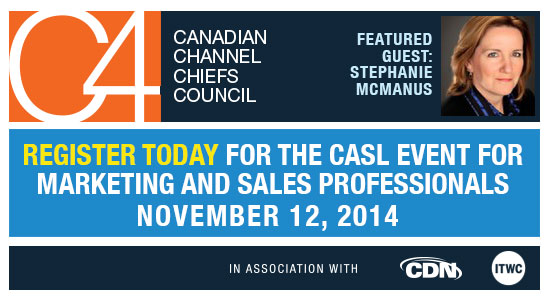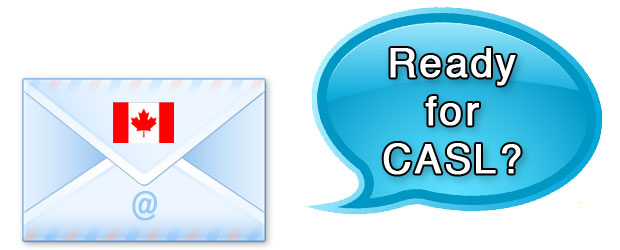The majority of small Canadian businesses are not prepared to deal with Canada’s Anti-Spam Legislation (CASL) which took effect July 1, according to a survey by United States-based email marketing firm.
The survey by Constant Contact found that only 29 per cent of Canadian businesses began preparations for CASL before July 1 and another 21 per cent of the respondents reported that they will “begin preparing soon” while the remaining half of respondents were evenly splits between those that were uncertain about when to prepare (25 per cent) and those that are not planning to make any changes to the way they contact customers (25 per cent).

“The relative inaction on the part of small businesses and their uncertainty about what needs to be done, underscores the need for CASL education,” said Guy Steeves, regional director for Canada West at Constant Contact. “While there is a grace period for some aspects of CASL, all businesses need to take action at this point.”
He said small businesses can avoid possible penalties by “focusing on permission-based marketing the way CASL outlines.” Constant Contact offers free CASL resources for small businesses and organizations, both in terms of education and marketing tools.
Businesses are taking very little action when it comes to other aspects of CASL compliance:
- 35 per cent of respondents are working to obtain express consent to continue emailing those contacts they had implied permission to contact
- 28 per cent have deleted contacts from their lists if they did not have permission to email them
- 28 per cent have included opt-in check boxes in online transactions allowing customers informed of CASL to join their email lists
- 15 per cent have posted the necessary legal language on physical email list sign-up sheets (e.g., in a store)
Under CASL, not only is the Canadian Radio-television Telecommunications Commission (CRTC) empowered to imposed a commercial penalty up to a maximum of $10 million on businesses that break the law, but individuals can also take private legal action against businesses that send them spam e-mail messages.
Since early June, people in Canada have been receiving a wave of emails from businesses asking them if they still want to receive online messages. CASL requires companies and organizations to obtain direct or implied consent from people in order to continue sending the people emails.
This last ditch effort to comply with CASL before the law comes down has ironically resulted in consumers essentially being spammed in the name of the anti-spam legislation.
According to Constant Contact, less than half (42 per cent) of small businesses feel they understand how to be CASL compliant. Just 33 per cent of small businesses are aware of the penalties associated with non-compliance.
“Despite the fact that CASL came into force July 1, it’s clear that small businesses are behind the curve when it comes to fully understanding the new legislation and what steps they need to take to be compliant,” said Lisa Kember, regional director for Canada East at Constant Contact.
The businesses taking steps to deal with CASL focus on the following:
- Educating themselves about regulations and how to be compliant (85 per cent)
- Reviewing current email contact lists to ensure proper permissions were in place (59 per cent)
- Keeping records of when, where, and how permission to email was obtained (51 per cent)
“Despite the fact that CASL came into force July 1, it’s clear that small businesses are behind the curve when it comes to fully understanding the new legislation and what steps they need to take to be compliant,” said Lisa Kember, regional director for Canada East at Constant Contact.







I figured if I ignored that wave of e-mails and never opted-in to any that would mean I would be removed from these lists. Newsflash! They keep on sending you e-mail! What a farce! Mike Duffy and Joe Fontana must be involved somehow!
You need to read up on CASL. If you don’t explicitly opt out they can continue to contact you. There are 2 grace periods.
If they don’t have a relationship with you (you NEVER had any dealings with them) there is a grace period until January 15, 2015 to get your consent.
If they do have a relationship with you there is a 3 year grace period. Not sure if this is until July 1 2017 or 3 years from the last time you had a transaction.
Also private right of action won’t be enforced until July 1, 2017. So individuals can’t get them fined until then.